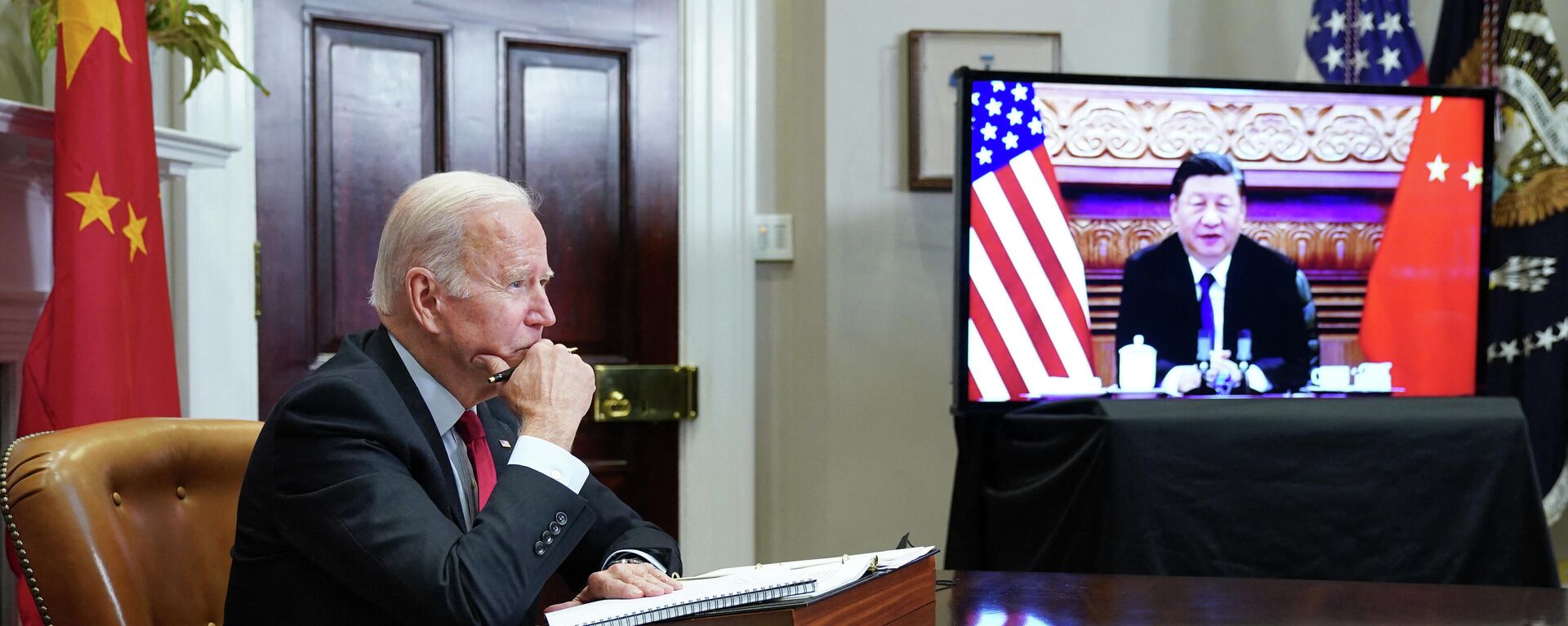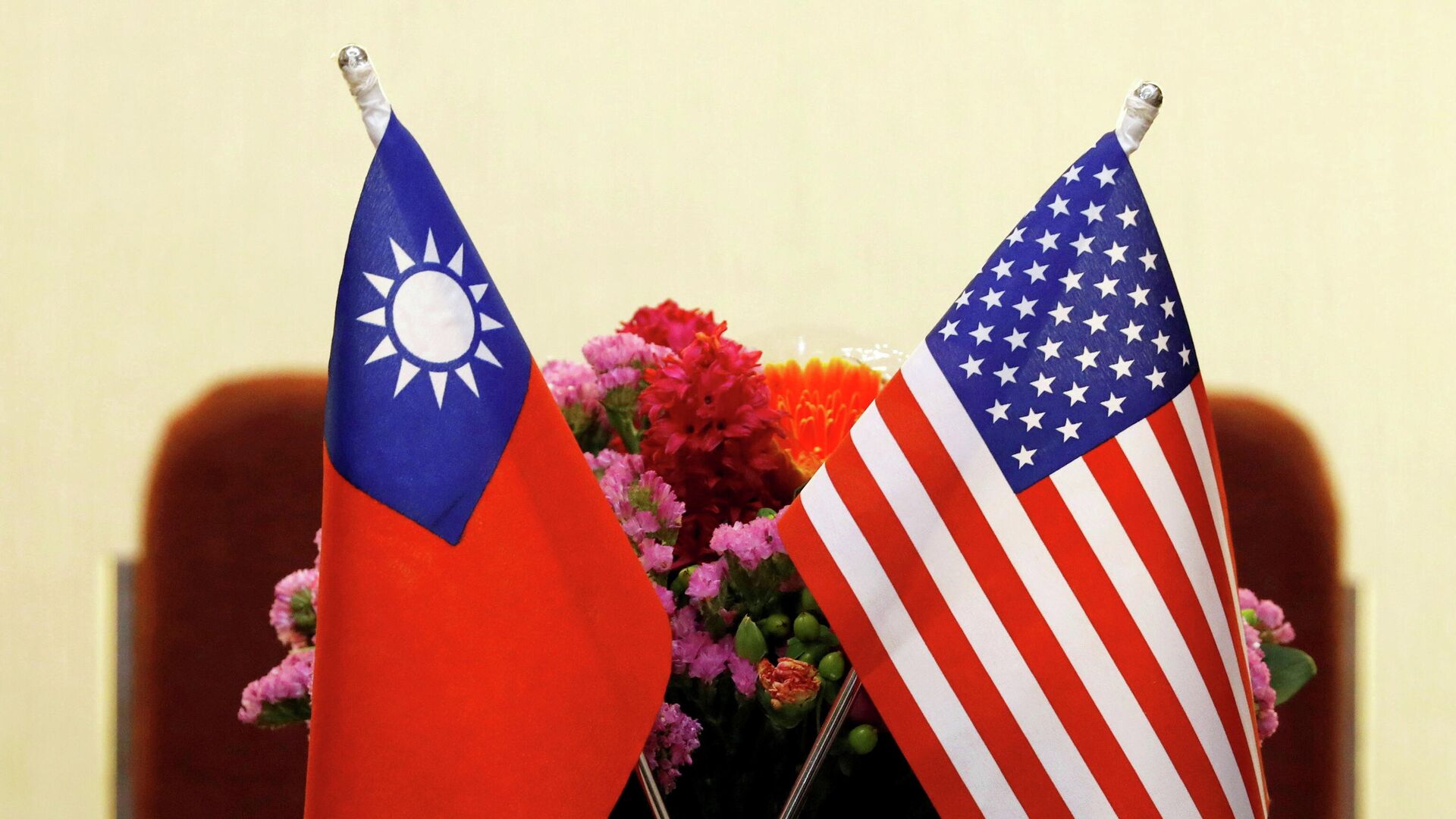https://sputnikglobe.com/20211118/congressional-think-tank-urges-us-to-take-robust-actions-on-taiwan-amid-tensions-with-china-1090815160.html
Congressional Think Tank Urges US to Take Robust Actions on Taiwan Amid Tensions With China
Congressional Think Tank Urges US to Take Robust Actions on Taiwan Amid Tensions With China
Sputnik International
Following an increase in informal military and diplomatic contacts between the US and Taiwan, Biden has since made confusing statements about Taiwan's... 18.11.2021, Sputnik International
2021-11-18T01:42+0000
2021-11-18T01:42+0000
2023-06-19T12:43+0000
us
china
taiwan's military
military & intelligence
chinese economy
taiwan
https://cdn1.img.sputnikglobe.com/img/07e5/0b/12/1090815905_0:0:3073:1728_1920x0_80_0_0_986966e313f40517175382253b4d1f5a.jpg
The US-China Economic and Security Review Commission (USCC), a bipartisan advisory council to the US Congress, claimed in its freshly released annual report to the legislative body that immediate measures are needed to bolster the credibility of US military deterrence against possible Chinese aggression towards Taiwan.The report specified that Congress should allow and allot funds for Taiwan to buy defense products from the US, and finance the deployment of cruise and ballistic missiles, as well as other weapons, in the Indo-Pacific, while also expanding surveillance funding.Moreover, according to experts, the informal policy of the so-called "strategic ambiguity," which helped in "preserving stability in the Taiwan Strait for decades," might be perceived by the Chinese as an "inconsistent or hesitant US commitment to Taiwan."The researchers noted that "this 'dual deterrence' approach" optimizes the US's flexibility, but "US gestures and statements intended to deter both parties could potentially cause Chinese leaders to perceive a contradictory, changeable, or reluctant US commitment."According to the report, the extent of China's nuclear buildup suggests it may be used to support a new limited nuclear first-use strategy. And "such a strategy would enable Chinese leaders to leverage their nuclear forces to accomplish Chinese political objectives beyond survival, such as coercing another state or deterring US intervention in a war over Taiwan."During a Monday virtual meeting between US President Biden and Chinese President Xi Jinping, the latter cautioned his American counterpart that any provocations on Taiwan would be met with retaliation.In his turn, on Tuesday, Biden underscored that the US will not advocate for Taiwan's independence and that the country's stance toward the issue will "not change at all."Economic Competition Also High on AgendaFurthermore, the report addressed a number of economic issues the US is facing with China, including a recommendation that Congress explore legislation to address dangers to US investors and interests in Chinese investment.The report suggested banning or at least better identifying the hazards of variable interest corporations, which are created by mainland Chinese companies to avoid the country's restrictions on foreign direct investment in specific industries and to list on US markets. According to the paper, US engagement in China's financial markets is growing, with the amount reaching $1.2 trillion by 2020, and "outpacing the US government's defense" against dangers posed by Chinese firms."These regulations could stop the use of variable interest entities, a regulatory loophole used by many Chinese tech firms to list on US exchanges," the report stated.
https://sputnikglobe.com/20211117/calling-americas-bluff-xi-biden-talks-confirmed-true-extent-of-us-ambiguity-on-taiwan---analyst-1090809827.html
china
taiwan
Sputnik International
feedback@sputniknews.com
+74956456601
MIA „Rossiya Segodnya“
2021
News
en_EN
Sputnik International
feedback@sputniknews.com
+74956456601
MIA „Rossiya Segodnya“
Sputnik International
feedback@sputniknews.com
+74956456601
MIA „Rossiya Segodnya“
us, china, taiwan's military, military & intelligence, chinese economy, taiwan
us, china, taiwan's military, military & intelligence, chinese economy, taiwan
Congressional Think Tank Urges US to Take Robust Actions on Taiwan Amid Tensions With China
01:42 GMT 18.11.2021 (Updated: 12:43 GMT 19.06.2023) Kirill Kurevlev
Managing Editor
Following an increase in informal military and diplomatic contacts between the US and Taiwan, Biden has since made confusing statements about Taiwan's independence and whether the US considers the island as such. Beijing views Taiwan as its province and has called on Washington to stop its provocations regarding the island.
The US-China Economic and Security Review Commission (USCC), a bipartisan advisory council to the US Congress, claimed in its
freshly released annual report to the legislative body that immediate measures are needed to bolster the credibility of US military deterrence against possible Chinese aggression towards Taiwan.
The report specified that Congress should allow and allot funds for Taiwan to buy defense products from the US, and finance the deployment of cruise and ballistic missiles, as well as other weapons, in the Indo-Pacific, while also expanding surveillance funding.
"To avoid a breakdown of deterrence, China must believe there are actions that could lead to a US response and that costs will be imposed if China takes those actions," the recommendation stipulated in the full 551-page report reads. "A lack of clarity in US policy could contribute to a deterrence failure if Chinese leaders interpret that policy to mean opportunistic aggression against Taiwan might not provoke a quick or decisive U.S. response."
Moreover, according to experts, the informal policy of the so-called "strategic ambiguity," which helped in "preserving stability in the Taiwan Strait for decades," might
be perceived by the Chinese as an "inconsistent or hesitant US commitment to Taiwan."
"By remaining opaque about US intentions, strategic ambiguity aims to create sufficient uncertainty among leaders in Beijing and Taipei to deter an unprovoked Chinese attack on Taiwan as well as rash moves by Taiwan’s leaders that could entrap the United States in a war," the report said.
The researchers noted that "this 'dual deterrence' approach" optimizes the US's flexibility, but "US gestures and statements intended to deter both parties could potentially cause Chinese leaders to perceive a contradictory, changeable, or reluctant US commitment."
"Moreover, US officials have suggested that an unprovoked Chinese attack on Taiwan might result in US intervention," they added, "but they have not specified how the United States would react to other belligerent Chinese activities below that threshold, such as a blockade or coercive activities in the gray zone."
According to the report, the extent of China's nuclear buildup suggests it may be used to support a new limited nuclear first-use strategy. And "such a strategy would enable Chinese leaders to leverage their nuclear forces to accomplish Chinese political objectives beyond survival, such as coercing another state or deterring US intervention in a war over Taiwan."

17 November 2021, 18:39 GMT
During a Monday virtual meeting between US President Biden and Chinese President Xi Jinping, the latter cautioned his American counterpart that any provocations on Taiwan would be met with retaliation.
In his turn, on Tuesday, Biden underscored that the US
will not advocate for Taiwan's independence and that the country's stance toward the issue will "not change at all."
Economic Competition Also High on Agenda
Furthermore, the report addressed a number of economic issues the US is facing with China, including a recommendation that Congress explore legislation to address dangers to US investors and interests in Chinese investment.
Thus, China's capital regulations "may limit investors’ abilities to move money out of equity and bond investments and the lack of oversight by trusted authorities may jeopardize investors' funds," the head of the commission, Robin Cleveland stated before Congress at the report presentation. "More importantly, numerous companies which will benefit from US investment have been formally identified as threats to US national security interests."
The report suggested banning or at least
better identifying the hazards of variable interest corporations, which are created by mainland Chinese companies to avoid the country's restrictions on foreign direct investment in specific industries and to list on US markets.
According to the paper, US engagement in China's financial markets is growing, with the amount reaching $1.2 trillion by 2020, and "outpacing the US government's defense" against dangers posed by Chinese firms.
"These regulations could stop the use of variable interest entities, a regulatory loophole used by many Chinese tech firms to list on US exchanges," the report stated. 

